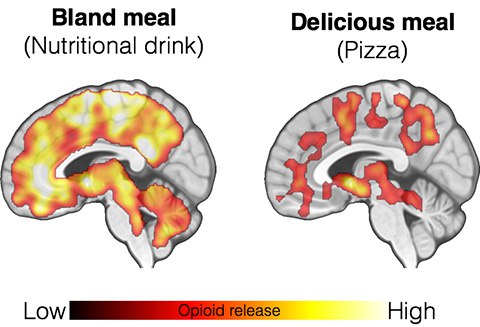Is overeating an addiction?/The relationship between obesity and the release of natural narcotics in the brain
Neurosafari Researchers at the PET Imaging Center at the University of Turku found that eating causes a large release of opioids (a naturally occurring narcotic in the body) in the brain, which is likely to be effective in creating feelings of satiety and pleasure.
According to Neurosafari, citing Turku University’s news site, eating a delicious pizza significantly increases the sense of pleasure, while drinking a drink with the same amount of nutrients and the same amount of calories does not produce this pleasure. However, both cases increase the release of natural narcotics in the brain.
The body’s natural narcotics are associated with feelings of pleasure and euphoria. This study shows that significant amounts of endorphins are released throughout the brain after eating a delicious pizza and even after consuming a tasteless drink (but with the same amount of calories). More interestingly, the release of endorphins after consuming a tasteless drink is more than eating a delicious pizza. Therefore, the intensity of the release of natural drugs (endorphins) is independent of the sense of pleasure created by eating food. However, researchers believe that probably the internal narcotic system plays a role in regulating the feeling of satiety and pleasure.
Dr. Lari Nomenma from Turku University PET Imaging Center states: “The internal narcotic system regulates appetite and eating; And we have already realized that the malfunction of this system is one of the symptoms of obesity (or morbid obesity). Recent findings show that overeating may cause excessive stimulation of the brain’s internal narcotic system (similar to addiction) and cause obesity in a person. These findings provide researchers with new opportunities to treat overeating and obesity.”
Dr. Jethro Tulari, a physician and researcher at this center, says: “It is surprising that endorphins are released at all levels of the brain, and this phenomenon occurs more strongly when consuming a tasteless drink. This finding provides researchers with a foundation for future studies on overeating, obesity, eating disorders, and addiction.”
Experiment design
This study was done with PET imaging technique. The participants were injected with a radioactive compound that binds to the opioid receptors in their brains. The radioactive activity in the brain was measured and recorded three times with a PET device: 1. After eating a delicious meal (pizza) 2. After eating a tasteless meal (bland drink) 3. After getting up from Sleep and before eating breakfast
https://goo.gl/B7afQP
Join the Neurosafari brain and neuroscience Telegram channel:
https://telegram.me/joinchat/CihxzDwTa19DOIUZRYLVjw
This post is written by neurosafari
